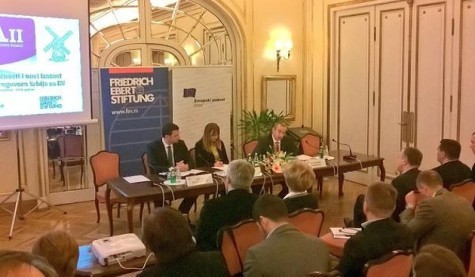Most of EU donations to Serbia have come from the instrument for pre-accession or IPA that has been implemened in the period 2007-2013, while IPA II regulation sets a new framework for providing pre-accession assistance for the next period 2014-2020 and is aimed at helping countries meet the political and the economic accession criteria, the head of the EU Delegation to Serbia Michael Davenport told a conference on opportunities and challenges that IPA II would provide in the Serbia’s accession talks with the EU.
“IPA II will focus more on helping countries meet the political and the economic accession criteria. It will focus on the fundamentals first: this includes building of democratic institutions, improving rule of law, reforming the judiciary and public administration, fostering fundamental rights and fighting discrimination. It will also further encourage regional and cross-border cooperation,” Davenport said.
“However IPA II will also put more emphasis on helping enlargement countries improve their economic governance and strengthen their public financial management. This will improve the economic outlook of these countries, increase the effectiveness of the investments and should also create more jobs,” he added.
Addressing the conference “Instrument for pre-accession IPA II 2014-2020: New opportunities and new challenges in the process of accession negotiations of Serbia with the European Union,” organised by European Movement in Serbia and Friedrich-Ebert Stiftung foundation, Davenport explained that the most important novelty of IPA II is its strategic focus.
“Together with our counterparts in Serbia and other beneficiary countries, we worked hard to create the so-called ‘Country Strategy Papers‘ for each beneficiary country for the 7-year period. These will provide for a stronger ownership of the beneficiaries by integrating their own reform and development agendas.”
IPA II also brings a stronger “sector approach”, a new corner stone of the EU assistance, ambassador Davenport said.
“Our funds now target reforms within the framework of pre-defined sectors, which cover areas closely linked to the enlargement strategy, such as democracy and governance, rule of law or growth and competitiveness,” he said.
Davenport added that such sector approach “promotes structural reform that will help transform a given sector and bring it up to EU standards.”
According to him, assistance will be more targeted and this should ensure better efficiency, sustainability and focus on results.
“Concretely it means that tangible reforms should bring more benefits to the Serbian citizens such as cleaner air, better consumer rights, more efficient courts, a more reliable public administration, healthier foods and many others,” Davenport said.




